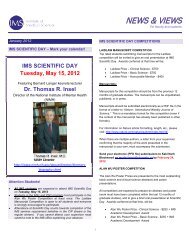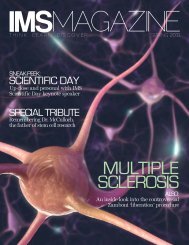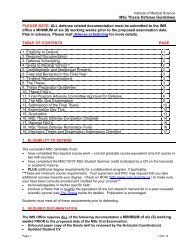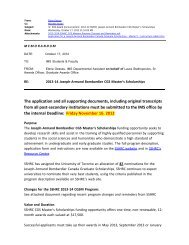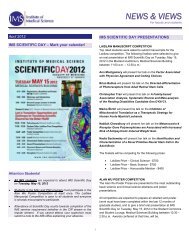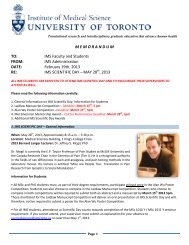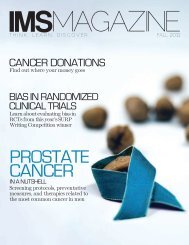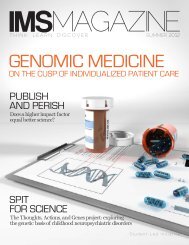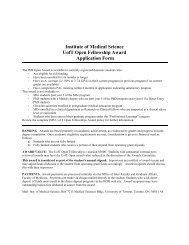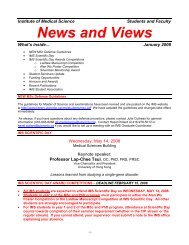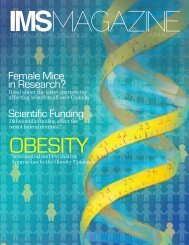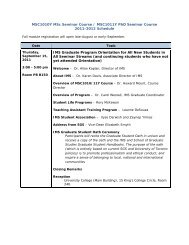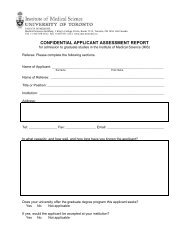PhD Examination Guidelines - Institute of Medical Science
PhD Examination Guidelines - Institute of Medical Science
PhD Examination Guidelines - Institute of Medical Science
Create successful ePaper yourself
Turn your PDF publications into a flip-book with our unique Google optimized e-Paper software.
<strong>Institute</strong> <strong>of</strong> <strong>Medical</strong> <strong>Science</strong><br />
PHD THESIS DEFENSE GUIDELINES<br />
All references cited in the thesis and all published sources identified in the Contributions section must<br />
be listed. In general, cite primary sources whenever possible. If using a secondary source, make this<br />
clear (e.g. "reviewed in...."). You can use any one <strong>of</strong> the standard formats for references but be<br />
consistent in its use. Double-check to ensure that references in the list are cited in the text and,<br />
conversely, that all citations in the text are listed in the References section. Missing citations, or<br />
references are a red flag to reviewers.<br />
THESIS FAQs<br />
1. How long should my thesis be?<br />
A Ph.D. thesis runs 150 - 300 pages plus references. It includes:<br />
• A scholarly Literature Review (~50+ pages)<br />
• statement <strong>of</strong> Hypotheses and Research Aims, (2-5 pages) experimental work equivalent in<br />
depth to what would typically be contained in 3-4 peer-reviewed papers in substantive journals<br />
• General Discussion (20-50 pages) and Future Directions.<br />
Consult with your supervisor and PAC to ensure that you have adequately covered the background to<br />
your question, your results and their significance to the field. You may also find it helpful to discuss<br />
your outline and thesis plans with one <strong>of</strong> the Graduate Coordinators.<br />
2. English is not my native language. Does my thesis have to be written in perfect English?<br />
The grammar and spelling in your thesis must be <strong>of</strong> high standard, just as they would need to be in<br />
articles submitted for publication. Please ask your supervisor and your committee to advise you on<br />
language adequacy. Do not fall into the trap <strong>of</strong> taking verbatim passages from published papers or<br />
textbooks because you think they are written in “better English” than you can produce.<br />
The following University <strong>of</strong> Toronto resources are available to students to improve their academic<br />
writing and speaking skills:<br />
Office <strong>of</strong> English Language and Writing Support (ELWS)<br />
http://www.sgs.utoronto.ca/informationfor/students/english<br />
School <strong>of</strong> Graduate Studies Resources: Writing and Speaking<br />
http://www.sgs.utoronto.ca/informationfor/students/english/wrtspk.htm<br />
3. When does borrowing from the work <strong>of</strong> others become plagiarism?<br />
Under The Code <strong>of</strong> Behaviour on Academic Matters, to plagiarize is to “… knowingly represent as<br />
one’s own any idea or expression <strong>of</strong> an idea or work <strong>of</strong> another” in an academic work. It is critical<br />
that the ideas and arguments <strong>of</strong> others be correctly attributed and simply paraphrasing these as your<br />
own does not suffice. A more extensive discussion <strong>of</strong> the subject is provided in the guide “How Not to<br />
Plagiarize”( http://www.utoronto.ca/writing/plagsep.html), an excellent online resource prepared by Dr.<br />
Margaret Procter, U <strong>of</strong> T Coordinator, Writing Support.<br />
4. Can I actually plagiarize my own work !?<br />
It may seem surprising, but reproducing your own published work without proper acknowledgement<br />
can be considered “self-plagiarism”. If you include such materials in your thesis, cite the published<br />
work and submit a letter <strong>of</strong> permission from the copyright holder, or a statement from the publisher<br />
(<strong>of</strong>ten available on journal websites) authorizing use <strong>of</strong> the material, when you deposit your thesis.<br />
Page 8



